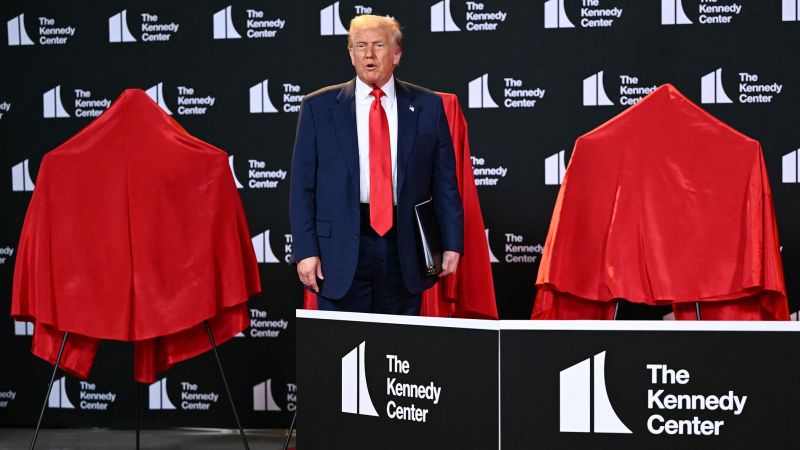On a notable Wednesday, President Donald Trump made an official visit to the Kennedy Center, where he announced the upcoming recipients of its prestigious honors and revealed that he would be personally hosting the institution’s awards ceremony scheduled for December. This visit underscores Trump’s continued engagement with cultural institutions within Washington, D.C., specifically as he seeks to assert more control in a city traditionally governed by Democratic leadership. The President has been determined to stamp his identity on the capital’s cultural landscape, and this visit reflects that ambition.
Trump’s involvement came alongside recent changes he has made to the Kennedy Center’s structure. Earlier in the year, he took the significant step of seizing control of its board of trustees, a move aimed at reorienting the center’s direction and programming. He publicly declared his intent to extensively revamp both the Kennedy Center and its offerings, symbolizing a broader strategy to reshape how American culture is represented, particularly in spaces that were previously considered apolitical. During his remarks, Trump proclaimed, “We ended the woke political programming, and we’re restoring the Kennedy Center as the premier venue for performing arts anywhere in the country, anywhere in the world.”
As he hosted the event, Trump emphasized his involvement in selecting the next line-up of honorees, a list that includes celebrated names such as George Strait, Michael Crawford, Sylvester Stallone, Gloria Gaynor, and the legendary rock band KISS. This choice reflects both a bid to connect with traditionally revered artists while underlying his narrative of revitalization, claiming a high level of personal commitment to the process.
This visit has also been marked as Trump’s third appearance at the Kennedy Center since he returned to office, indicating an increasing personal interest in the performing arts complex and its activities. Discussions surrounding a financial commitment of $250 million from Republicans for renovations to the center further contextualize this event as a backdrop for Trump’s attempts to solidify his influence. The Kennedy Center, through a statement shared on social media, expressed gratitude toward Trump for his advocacy, asserting that renovations would restore the center to its former grandeur.
Alongside taking control of the Kennedy Center, Trump has applied pressure on numerous other cultural institutions in Washington, including museums and memorials. He has criticized what he described as a “revisionist movement” aimed at undermining the accomplishments of the United States, leading to an executive order in March that directed a review of Smithsonian exhibits for alignment with this perspective. This takes part in a broader initiative to reshape cultural narratives within D.C., striving to present a viewpoint more favorable to his administration’s ideology.
Moreover, the President’s approach toward federal influence extends beyond cultural institutions; he has initiated renovations within the White House itself and taken the unprecedented step of federalizing the police force in Washington amidst rising concern over crime and homelessness in the city. This course of action represents a continuation of a strategy that seeks to embed federal presence and oversight more deeply into the fabric of D.C.
Throughout his time in office, Trump has experienced a complex relationship with Washington’s cultural scene, particularly considering that during his first term, he largely distanced himself from local cultural institutions in light of their resistance to his policies. Notably, he did not attend the Kennedy Center Honors for the duration of his first term, largely avoiding engagements after honorees expressed their discontent with his administration.
In this renewed effort, the Kennedy Center has become a pivotal stage for political theatre, embroiling itself in the nation’s culture wars under Trump’s directive. The appointment of new board members has provoked backlash from Democrats, and prominent artists, including those connected to the musical “Hamilton,” have since distanced themselves from the center, indicative of the contentious atmosphere that Trump’s involvement has cultivated.
As Trump continues to assert his influence over both the Kennedy Center and other cultural establishments, changes are evident in the programming as well. Recently, the center announced it would host the premiere of a film produced by the Christian Broadcasting Network, signifying an ideological shift under Trump-appointees and an alignment with values that resonate with his support base.
In the realm of political and cultural symbolism, the Kennedy Center serves as a backdrop for showcasing loyalty to Trump’s agenda. Legislative attempts to rename parts of the center after Trump and other initiatives embody both support and division, stirring discussion around arts, culture, and politics in America. While proposals like Rep. Bob Onder’s initiative to change the center’s name to honor Trump have yet to gain traction, they indicate the ongoing intertwining of political identity, public space, and cultural expression in contemporary America.











